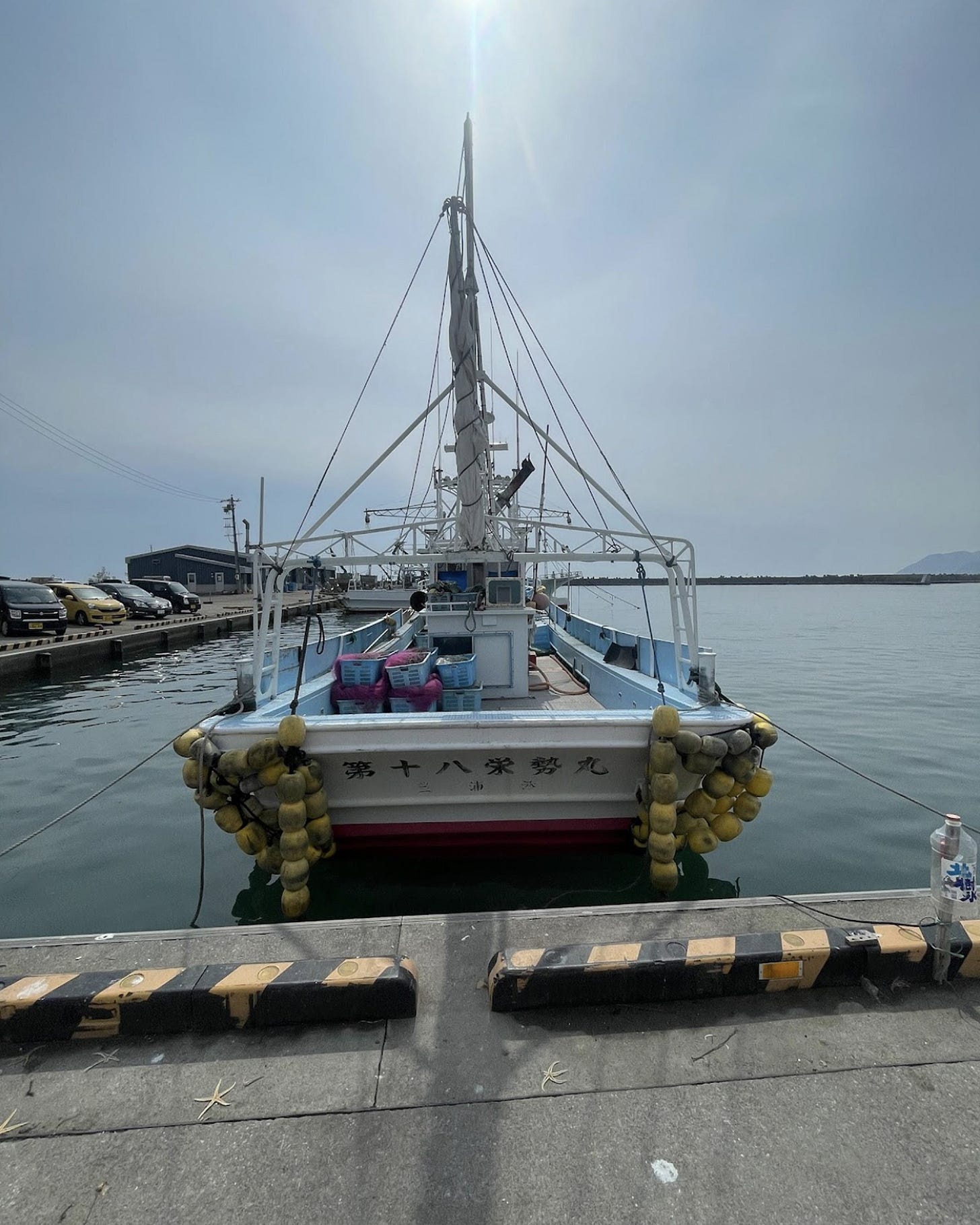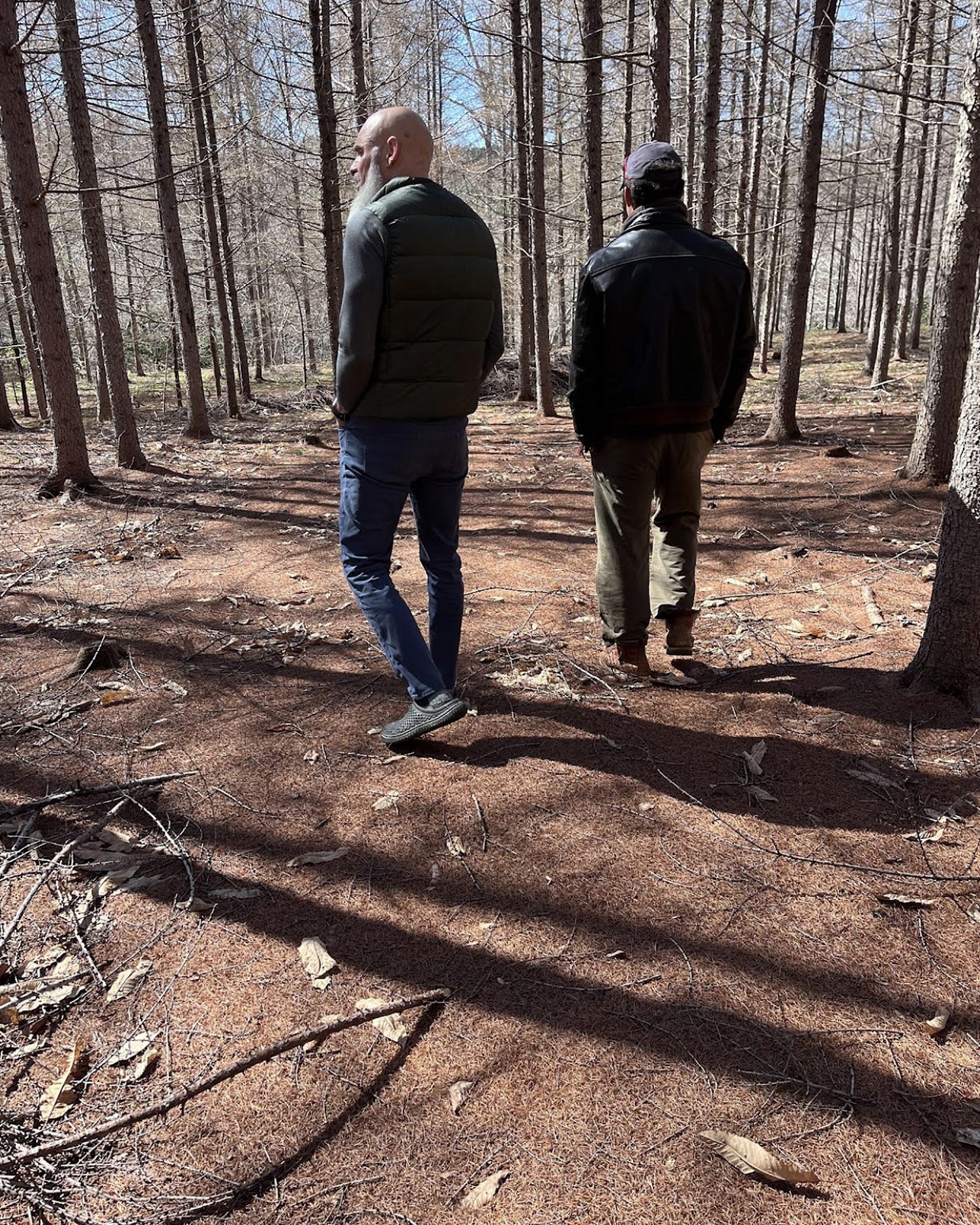I didn’t know my dad played tennis with his dad. That that was how he started playing. My dad never got on well with his dad; as the eldest of four, he took the brunt of his dad’s moods. My grandpa, a US Air Force Colonel, was a tough, cutting man. My dad had already been living in Japan four years when my grandpa passed, at age 87, in 2017.
I don’t know if they ever fully resolved things.
It's Palm Sunday of 2025 and we’re at the dome on the outskirts of a small fishing village near Lake Toya in Hokkaido. I’m out here visiting my dad, something I’ve only done once since he expatted, twelve years ago to the month. I flew up from Tokyo on Wednesday; I’ll be here till Easter Sunday.
The dome is the athletic complex in town; we’re here for my dad’s weekly tennis run. There’s also a town community center, public bath, 7-Eleven, and K-12 school—where my dad has taught English for twelve years, it’s what brought him out here.
My dad is almost 70 but is strong and hale, shiny bald head and big white Gandalf beard. I don’t have a racket so my dad lends me his old one, in fact it’s Daisuke’s, Daisuke is who runs the run. The run is me, my dad, Daisuke, Daisuke’s wife, Daisuke’s daughter, and a handful of others including Tanaka and Sakurai, middle aged guys in sweatpants and wristbands who join each week. I’m not sure what they do for work, my dad isn’t either. We play mixed, randomized doubles of four-game sets.
Warming up on a side practice net that’s just blue PVC piping only a fraction as wide as a regular net, trying to stay accurate so the ball doesn’t leak onto the game on the main court, I bring it up again.
“You really don’t remember me beating you?”
Since yesterday, when he texted Daisuke that I’d be joining, and Daisuke asked what skill level I was at, and my dad tried to play me by saying I “hadn’t played in some years but seemed confident,” to which I was all, “Don’t forget—I beat you before.”
Which my dad then tried to deny, claiming he didn’t remember, before finally conceding—Maybe.
Maybe one set.
It would have been circa 2009. We started playing midway through high school, when he came back around after a stint living in Germany. There were these courts in Santa Cruz down by the Natural Bridges school and State Park, fenced in and nestled in back of a big field, by a skateboarding bowl. I was set to play basketball in college already, I was naturally athletic. But it became a thing we did, a thing he could teach me, the technical side of it. Forehand and backhand grips, adjusting your top knuckle one notch on the octagonal racket handle, depending. Scratch the middle of your back with the racket before coming over top in a north-south motion for the serve. We’d mostly rally, it was the era of Rafael Nadal and Roger Federer and Andy Rodick, and I’d alternate between shots based off of mimicry of those players, topspinning a forehand winner perfectly, and complete yanks into the adjacent court. I had no consistency.
I can’t remember whether I was still in high school or if it was after that I beat him that set.
“I’m still not sure you did,” he says.
I scoff-laugh, hit my first warmup backhand all wayward and into the game, my dad has to scramble after it.
My dad would play through high school, but it was his little brother, Mark, who excelled. Mark went on to play at Stanford right before McEnroe’s time, they overlapped a year. And he would take that discipline he cultivated playing tennis with him throughout his life, becoming a successful real estate mogul. Whereas my dad would channel the solitary asceticism of tennis in a different way—to try, multiple times, to become a priest.
We’re at the public baths in town for dinner one night when I realize it was multiple times that he tried. Three. The first was when I was little, when we were living in Scotland, in a community for handicapped folks. This was what my parents did for most of my early childhood, lived and worked in communities for people with mild to severe handicaps. When I was between 5 and 8, my dad was all set to leave for his priest training, only the responsibilities of fatherhood took precedence, on urging from my mom, and it fell through. The priest who was recommending him decided at the last minute that he was an unfit candidate. I can feel the residual sting of this as he recounts it.
The second time was when I was in middle school, shortly after he remarried the first time—when I was in fifth grade, so circa 2002. My dad put his marriage on hold and went out to England to undergo a priest training, and in fact was almost all the way through it when he suddenly missed his wife, reached out to her and said he was coming back to her, bailing on the training. They’d split some years later.
The last time was the time right before he came out to Japan. The program took on maybe ten candidates, and three made it through. He got axed the first of four semesters. He’s been here since.
We play the first game together. Our numbers in the number pool are successive since we arrived together. My forehand is A-1, and my backhand is serviceable, but my serve is trash. It’s good, but inconsistent. I get up forty-love the first game then double fault three times in a row. We lose the game.
My dad’s game is solid. Very Pete Sampras coded—like my crossover, no matter how I tried to hide it, is Iverson’d, we can’t hide who we most imitated learning the sport. Like Sampras, his serve is his strongest skill. He’ll make his body all compact and primed reptilian-ly, about to strike, and then WHACK, he smacks the shit out of it like a sword strike how he smashes right through it. He’s tall so his short game is strong. He’ll hit some winners, but his weakness is overdoing it, trying to overhand smash too hard, to pass someone too overzealously. Unforced errors.
I ask if he ever beat his dad. He didn’t, he tells me, but Mark once did. Late in high school, when Mark was getting really good.
“He was so pissed,” my dad says, about my grandpa Wallace. “He said, ‘Eric, let’s go,’ and threw our stuff in the car and took off. Made Mark walk home!”
During a break he says he remembers now, it was a single set I won, he was going easy initially, and then I got on a roll and he started trying for real. But by that point it was too late.
“Going easy, huh. Sure you were,” I say.
But I quietly agree. That’s likely what happened.
I only bring up the priest thing because it seemed to represent a stalled path that caused a type of avoidance, or escapism, or loss of faith. My dad was very spiritual and studious and prone to bursts of inspiration growing up. He brought me into his worldview, one filled with awe and wonder. At some point, I’d never see him or hear from him unless I reached out, and when I did he always seemed distracted or anxious or scattered. He’s calm and in his body and lucid this trip. His physical vessel is stronger, healthier. He’s more tapped into reading and working out. We get into virtually no fights.
And the weekly run must have something to do with this, both physically and socially.
“Scaresama,” we tell each other after the last game, an untranslatable Japanese phrase of encouragement that means something along the lines of, “We’re all tired now because we did a good job, good job everyone,” or “way to tire ourselves out, everyone,” but that’s not quite it either—again, it’s untranslatable.
Sean Thor Conroe is a Japanese American writer.









Hey! You’re welcome to join us again anytime. In the meantime, I’ll look after your dad here in Toyoura. 😂
Good luck, Sean.
Daisuke
Like Sampras, his serve is his strongest skill. He’ll make his body all compact and primed reptilian-ly, about to strike, and then WHACK, he smacks the shit out of it like a sword strike how he smashes right through it 😎😍